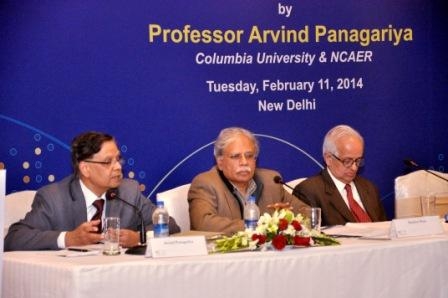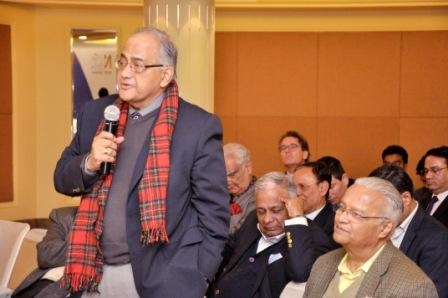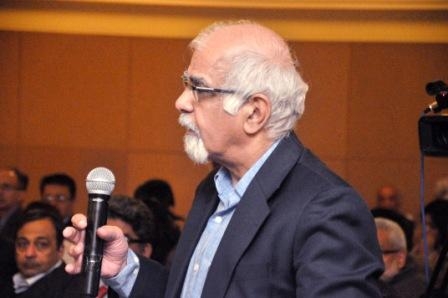A lecture by Professor Arvind Panagariya on “A Reform Agenda for India’s new Government” was second in the series of lecture, instituted in memory of Sir Chintaman Dwarakanath Deshmukh, one of India’s most eminent economists and a founding father of NCAER. In his lecture, Professor Panagariya stressed that the overarching objective of the reforms by the new government must be targeted towards building a prosperous, strong and modern India. Presenting to a large audience at The Claridges, he outlined a strategy of reforms along two tracks. This lecture by Professor Panagariya was later published.
Arvind Panagariya
Arvind Panagariya is Professor of Economics & Jagdish Bhagwati Professor of Indian Political Economy and Director of the Columbia Program on Indian Economic Policies at Columbia University. He is also a Nonresident Senior Fellow at NCAER. In 2012 the Government of India honoured Panagariya with the Padma Bhushan for his contributions in the field of economics and public policy. Panagariya has been the Chief Economist of the Asian Development Bank and Professor of Economics and Co-director of the Centre for International Economics at the University of Maryland, College Park. He has worked with the World Bank, IMF, WTO, and UNCTAD in various capacities. Panagariya has written or edited more than a dozen books. His book India: The Emerging Giant (2008) was listed as a top pick of 2008 by the Economist magazine. The Economist has described his latest book (with J. Bhagwati) Why Growth Matters (2013) as “a manifesto for policymakers and analysts.” He writes a monthly column in the Times of India. Panagariya is co-editor of the India Policy Forum, the highest ranked economics journal out of India based on RePEc citation counts and published by NCAER with Brookings.
Bimal Jalan
Bimal Jalan is one of India’s best known economists. He was Governor of the Reserve Bank of India from 1997 to 2003 and nominated thereafter to the Rajya Sabha. He was the President of NCAER’s Governing Body during 1998-2008. Jalan is currently chair of RBI’s Committee for issuing new bank licenses. He has served as India’s Chief Economic Adviser, Banking Secretary, Finance Secretary, Member-Secretary of the Planning Commission, and Chairman of the Economic Advisory Council to the Prime Minister. He has represented India as Executive Director on the boards of the International Monetary Fund and the World Bank. He has written extensively on the Indian economy. His latest book is Emerging India: Economics, Politics and Reforms (Viking/Penguin, 2012).
About C.D. Deshmukh
Sir Chintaman Dwarakanath Deshmukh was the first Indian to be appointed Governor of the Reserve Bank of India in 1943 and was part of the official Indian delegation to the 1944 Bretton Woods Conference that led to the creation of the World Bank and the International Monetary Fund. He served as the Union Finance Minister during 1950 to 1956 under Nehru and was a founding member of NCAER’s first Governing Body. He later served as Chairman of the University Grants Commission and Vice-Chancellor of Delhi University, during which time he also founded the India International Centre. He was honoured by the President of India with the Padma Vibhushan in 1975. NCAER is privileged to honour the memory of C. D. Deshmukh as part of its own legacy.
The first lecture in this series was delivered by Prof Kaushik Basu in January 2013. Read more


 Events
Events 



